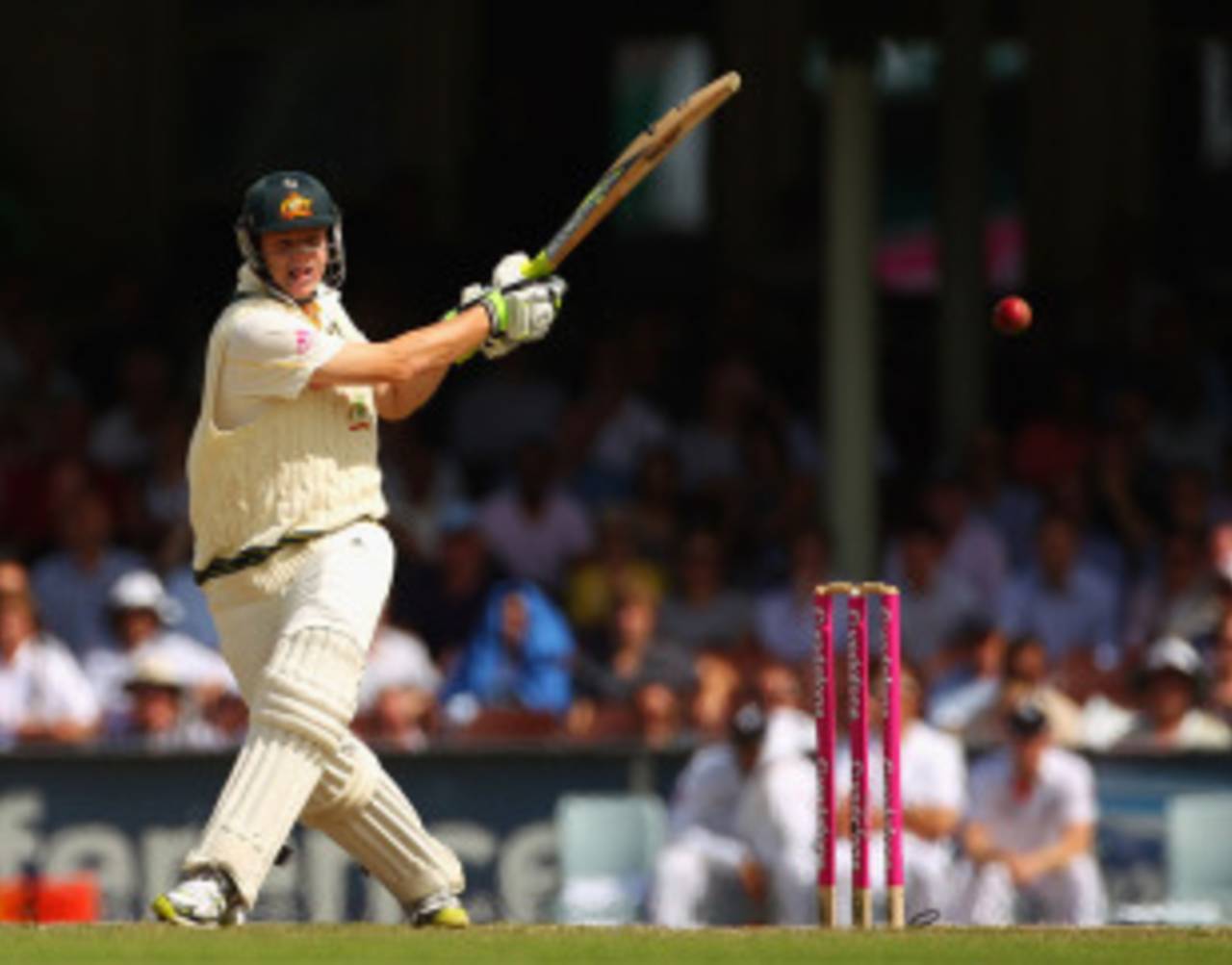Making the best of it
Australia's selectors are desperately hoping their squad will evolve into a team far greater than the current sum of its 17 parts
Daniel Brettig
Jan 31, 2013, 6:22 AM

Steven Smith's batting method has matured since his first taste of Test cricket • Getty Images
Michael Hussey was meant to be in this squad. So too Jon Holland, and Andrew McDonald. After Holland fell to injury, Michael Beer was the next left-arm spinner in line. Shane Watson was to be included as a batsman who could bowl. And one of Ben Hilfenhaus or Ryan Harris would certainly have been chosen had they been fit.
Questions about the composition of Australia's Test squad to tour India need to be made with all these absentees in mind, for the national selectors' initial thoughts about the task of four Tests on the subcontinent had a far different tour party being chosen. Since that time, an unexpected retirement has created one major gap, injuries have opened up others, and the Big Bash League left John Inverarity's panel with precious little relevant recent cricket from which to draw their conclusions.
So in circumstances "less than ideal", a favourite recent phrase of those in Cricket Australia's team performance hierarchy, the 17 named for India provide the captain Michael Clarke with a vast array of options for the various scenarios that may lie ahead of him across the matches in Chennai, Hyderabad, Mohali and Delhi. Clarke wants those options because he is not entirely sure what is in store, nor how his players will respond to what they find.
Hussey's absence remains a hole the team will have enormous trouble covering. Looking at the two back-up batsmen chosen for the trip in Usman Khawaja and Steven Smith, Hussey's value can be quantified by noting he was effectively a higher skilled amalgam of both players. There was Khawaja's technique and comfort against the new ball, but also Smith's middle order invention, athletic fielding and occasional bowling, albeit medium pace rather than spin. These attributes were wedded to vast experience and a team ethic unsullied by the onset of the Twenty20 age. The coach Mickey Arthur was not joking when he said every other member of the Test side will now have to get "15% better" to cover Hussey's loss.
The inclusion of Smith reflects the fact that the selection panel installed after the Argus review now have an opinion of him no lower than that held by those who sat in their positions before it. Over the past two home summers Smith has played plenty of first-class cricket, engendering respect among Sheffield Shield opponents for a batting method that has grown more mature and balanced. Only one century in that time is a cause for concern, but Smith has at least shown an ability to get started consistently, and it is starting an innings that is considered among the most vexing elements of batting in India.
In preparing the squad, most careful thought has evidently been given to the mixture of allrounders and spin bowlers chosen. As England did on their recent subcontinental visits to Sri Lanka and India, Inverarity's panel have attempted to allow room for subtle changes in balance depending on the nature of the pitch, the weather and the state of the series. Samit Patel was not the reason England won Test matches in Colombo, Mumbai and Kolkata, but handy innings prevented his team's tail from subsiding in each match while his bowling offered a useful back-up when needed.
Australia's absentees
Michael Hussey (retired)
Andrew McDonald (hamstring)
Jon Holland (shoulder)
Michael Beer (shoulder)
Ben Hilfenhaus (side/rib)
Ryan Harris (delayed recovery from shoulder surgery)
Shane Watson (touring but not bowling)
It is this sort of role that is envisaged for Glenn Maxwell and Moises Henriques. In the words of Inverarity, the permutations are thus: "One of the options is to play two pace bowlers, our two leading spinners and then a medium-fast allrounder in Moises Henriques. Another alternative is to play three pace bowlers, our leading spinner whether that be Xavier Doherty or Nathan Lyon, and then have the backup of the allrounder with Glenn Maxwell. Of course we could go with four bowlers and no allrounder, but the thinking is we will need more than four bowlers, we will need four bowlers and some more, so Glenn Maxwell is to the fore there and also Moises Henriques."
There will be some pressure on Lyon to hold his spot, particularly if the desire is for two slow bowlers turning the ball in opposite directions. Doherty's place is contentious when his first-class record, both overall and this summer, is lined up against that of the New South Wales captain Steve O'Keefe. But in the aforementioned absence of much Shield cricket due to the BBL's encroachment, Doherty's ODI returns and more consistent place in the national squad carried more weight than O'Keefe's eight wickets for the Blues against Western Australia at Blacktown Oval.
As has been the case for some time, Australia are served best of all in pace bowling, with the emergence of Jackson Bird adding another strong seam-up presence to the squad. Much is likely to be expected of Peter Siddle and Mitchell Johnson, who first toured India for Tests as far back as 2008, while Mitchell Starc and James Pattinson will resume the young bowlers' rotation they engaged in during the home summer.
In all, it is no great assumption to suggest that Australia's selectors are desperately hoping their squad will evolve into a team far greater than the current sum of its 17 parts. The national team's first squad since Hussey's retirement was always going to require an element of speculation, and not for the first time the captain, coach and selectors must now hope like hell that a few of their gambles grow into sure things somewhere on their passage to India.
Daniel Brettig is an assistant editor at ESPNcricinfo. He tweets here